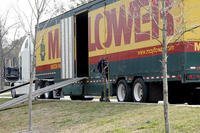When Army veteran Chris Stout transitioned out, he noticed something about homeless people that others didn't: A disproportionate number of them are veterans.
For a while, he used his own money to help put them up in motels, but he knew that wasn't a permanent solution to the growing problem.
He and two other veterans, Kevin Jamison, a Marine, and Mark Solomon, a Navy reservist, came together to found the Veterans Community Project, a nonprofit that builds tiny home villages for homeless veterans, in addition to providing a one-stop shop for other services.
The Veterans Community Project's community center is in south Kansas City, Missouri, helping veterans transition from homelessness back to a stable community and a steady job. For the first half of 2024, the nonprofit organization reported that it assisted 702 “at-risk and in-crisis” veterans; 2,540 veterans visited one of its case managers; veterans in crisis received an average of $851 in assistance; and 16 vets moved into homes in a VCP Village.
The Veterans Community Project has locations in five states: Missouri (Kansas City and St. Louis), Arizona (Glendale), Colorado (Longmont), South Dakota (Sioux Falls) and Wisconsin (Milwaukee).
Related: Search for Veteran Jobs
Stout has seen his own share of struggles and knows intimately how difficult it can be for veterans to ask for help.
He said veterans first need to overcome the stigma associated with asking for help and know that the veteran community is there for them. He also emphasized that vets need to hold on to their military training about being accountable and owning their actions. He believes that, by owning their bad choices, they can find their way out of a vicious cycle and begin making choices that lead to healing and wholeness.
Here are Stout's top tips for veterans looking to transition to civilian life:
1. Connect with other veterans in your community. They will have learned lessons and have guidance more valuable than a brochure.
2. Ask for assistance before it's too late. When Plan A doesn't pan out, be prepared to execute a Plan B and ask for help pulling yourself out of the hole.
3. You're not alone. You're not the first to struggle with the Department of Veterans Affairs, and you're not the first to struggle with home life. Know that there are people who understand and can help sort it out. Often, when veterans transition, they view it as if they are the only ones traveling this road or the first blazing the trail. That's not the case.
4. If you're a veteran, act like one. That means accepting responsibility, being on time, holding yourself accountable, having integrity and not acting entitled.
5. Work as hard as you did while you were in the service every day. It doesn't matter what you do when you get out; if you keep the drive, you will be OK.
The Next Step: Get Veteran Jobs Tips
Looking for transition and veteran jobs tips? Military.com has you covered. Subscribe to Military.com to have military news, updates and job resources delivered directly to your inbox.












